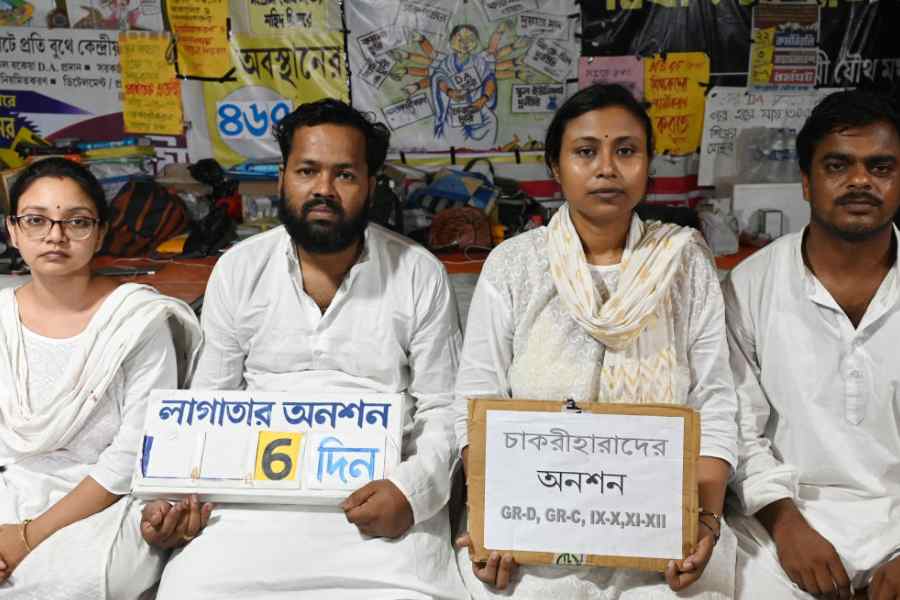The Supreme Court on Tuesday stayed the Calcutta High Court order cancelling the recruitment of over 23,000 teachers and non-teaching employees by the West Bengal School Service Commission (WBSSC).
The top court, however, said that those employees whose appointments were found to be illegal would have to refund their salaries. The court didn’t clarify how the illegal appointees would be identified.
A bench headed by Chief Justice of India D.Y. Chandrachud permitted the CBI to continue its investigation into the alleged scam provided the central agency did "not take any precipitative action" against the accused persons. It posted the matter for further hearing to July 16.
The bench, which included Justices J.B. Pardiwala and Manoj Misra, passed the directions after a marathon hearing that started at 10.30am and concluded at 5.15pm.
“Bearing in mind the present state of proceedings, an expedited hearing is called for and we accordingly list the matter on July 16. In the meantime, we are inclined to continue the ad interim protection given earlier by this court in the order dated November 9, 2023, subject to the express stipulation that any person found to have been appointed illegally and continuing as a consequence of the present order shall refund the salaries that would come to the four categories of individuals…,” the CJI said while dictating the order.
The bench was dealing with a special leave petition (SLP) filed by the Bengal government challenging the Calcutta High Court order. The state government and several aggrieved candidates were represented by senior lawyers such as Rakesh Dwivedi, Abhishek Manu Singhvi, V. Giri and Shyam Divan. Senior advocate Bikash Ranjan Bhattacharyya and others had represented the petitioners in the high court.
Solicitor-general Tushar Mehta appeared for the CBI.
During the hearing, the apex court made it clear that it was not in favour of the blanket cancellation of recruitment but would rather prefer to segregate the illegally appointed candidates from the genuine ones.
CJI Chandrachud said the cancellation of the entire process should be the “last resort”.
“This court cannot be unmindful of the teachers appointed in large numbers and the consequence of upholding the impugned judgment (of the high court),” the bench said.
It added: “The public job is scarce and nothing remains if the faith of the public
goes. This is a systemic fraud. What remains in the system if their appointments are
also maligned? People will lose faith.”
On April 29, the apex court had stayed the high court order directing a probe into the role of Bengal government officials in creating supernumerary posts to fill some vacancies.
The court had then refrained from staying the entire high court order quashing the recruitment process but agreed to take up the matter for further hearing.
Chief minister Mamata Banerjee posted on X on Tuesday: “I am really very happy and mentally relaxed on receipt of justice at the highest Court of the land. Congratulations to the entire teaching fraternity and my humble regards to the Hon’ble Supreme Court of India.”
“The Honorable Supreme Court has DEFUSED the BJP’s ‘EXPLOSIVE’ hurled last week to malign Bengal’s image and destabilise WB government. TRUTH HAS TRIUMPHED!” posted Trinamool MP Abhishek Banerjee posted on X.
Education minister Bratya Basu told reporters: “Those who are responsible for the appointment of the undeserving candidates are behind bars. We will maintain absolute transparency in the ensuing recruitment process.”
In its SLP, the Bengal government has contended that the high court ruling would lead to a “huge vacuum in the State Schools”, “rendering the education system at a stand-still”.
Although the high court cancelled the jobs of 25,753 teachers and non-teaching employees, Bengal’s appeal put the figure at “23,123”.
The WBSSC chairperson had earlier said: “We mentioned the figure of 23,123 because the commission had originally recommended that many candidates for appointments. Later, the number swelled following various court orders....”
In the appeal filed through the state’s standing counsel Astha Sharma, the Bengal government complained that the high court had clubbed together a host of issues. Instead of segregating the valid appointments, the state government maintains, the court erroneously set aside the entire selection process.











